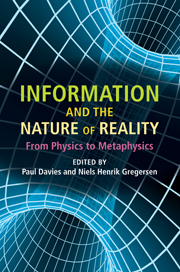Book contents
- Frontmatter
- Contents
- About the authors
- Acknowledgments
- 1 Introduction: does information matter?
- Part I History
- Part II Physics
- Part III Biology
- 7 The concept of information in biology
- 8 What is missing from theories of information?
- 9 Information and communication in living matter
- 10 Semiotic freedom: an emerging force
- 11 Care on Earth: generating informed concern
- Part IV Philosophy and Theology
- Index
- References
11 - Care on Earth: generating informed concern
from Part III - Biology
Published online by Cambridge University Press: 06 December 2010
- Frontmatter
- Contents
- About the authors
- Acknowledgments
- 1 Introduction: does information matter?
- Part I History
- Part II Physics
- Part III Biology
- 7 The concept of information in biology
- 8 What is missing from theories of information?
- 9 Information and communication in living matter
- 10 Semiotic freedom: an emerging force
- 11 Care on Earth: generating informed concern
- Part IV Philosophy and Theology
- Index
- References
Summary
Evolutionary natural history has generated “caring” – by elaborating, diversifying, conserving, and enriching such capacities. A first response might be to take care about that “caring”; the word is too anthropopathic. The framework one expects in contemporary biology is rather termed the evolution of “selfishness” (as if that word were not also anthropopathic). Selfishness, however, is but one form of caring; “caring” is the more inclusive term. Minimally, biologists must concede that organisms survive and live on, and that, over generations, they seek adapted fit. Or, if “seek” is still too anthropopathic, they are selected for their adapted fit. Maybe “select” is still too anthropopathic. Try computer language: the organic systems are “calculating.” Whatever the vocabulary, for all living beings some things “make a difference”; they do not survive unless they attend to these things.
At least after sentience arises, neural organisms, human or not, evidently “care.” Animals hunt and howl, find shelter, seek out their habitats and mates, feed their young, flee from threats, grow hungry, thirsty, hot, tired, excited, sleepy. They suffer injury and lick their wounds. Sooner or later every biologist must concede that “care” is there. Call these “interests” or “preferences” or whatever; if “caring” is too loaded a term, then call these animal “concerns.” Staying alive requires “self-defense.” Living things have “needs.” One of the hallmarks of life is that it can be “irritated.” Organisms have to be “operational.” Biology without “conservation” is death.
- Type
- Chapter
- Information
- Information and the Nature of RealityFrom Physics to Metaphysics, pp. 205 - 246Publisher: Cambridge University PressPrint publication year: 2010
References
- 2
- Cited by

